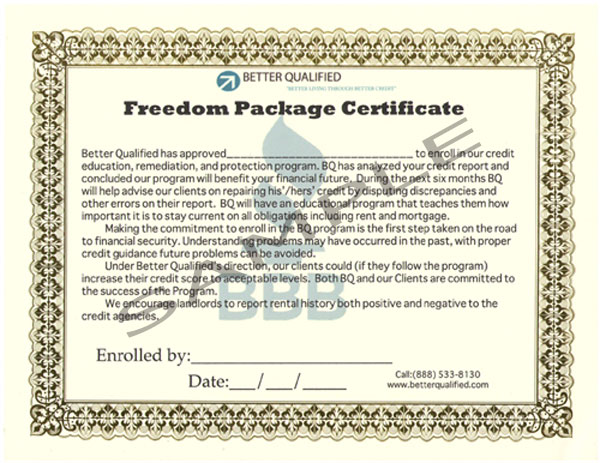Better Qualified has partnered with Identity Theft 911 to provide identity theft protection, management and resolution services as coverage enhancements to customers. This new program provides Identity Theft 911’s LifeStages™ Identity Management services to customers and their families at no charge, including 24/7 dedicated access to a fraud specialist for personalized support with proactive assistance and identity theft recovery services.
SCOTTSDALE, Ariz. June 14, 2011 — Identity Theft 911, the nation’s premier identity management and data risk management services provider, today announced that Better Qualified, a leader in credit restoration and identity theft services, has chosen the company to offer identity protection and identity theft resolution services to customers. Better Qualified customers and their family members now benefit from Identity Theft 911’s LifeStages™ Identity Management services during the times in life when they are most susceptible to identity theft.
According to the 2011 Identity Fraud Survey Report by Javelin Strategy & Research, the average consumer out-of-pocket cost due to identity fraud increased 63 percent from $387 in 2009 to $631 per incident in 2010. Along with the higher cost of resolution fees, the average time spent resolving identity fraud issues increased from 21 to 33 hours, emphasizing the need for better consumer education and resolution services. Recognizing this trend, Better Qualified customers have the convenience and benefit of a trusted advisor they can turn to for help resolving crises in credit and identity theft.
“Knowing that your credit report is being monitored for any changes, while also having access to a fraud specialist with a simple phone call is priceless.” said Paul Oster, CEO, Better Qualified. “We are in the business of protecting and restoring clients’ credit, so our partnership with IDT911 brings additional value to our customers with a resource to help fight the fastest growing crime in America.”
Identity Theft 911 fraud specialists provide high-touch service to victims from the initial call through case resolution. Their expertise covers a range of issues, from proactive measures that provide protection to resolution in the case of true identity theft and account takeovers. The fraud specialists work one-on-one with victims and are available 24 hours a day, seven days a week until resolution is complete.
“Identity theft continues to rise and has become more complex, leaving victims alone in trying to restore their reputation and identity,” said Matt Cullina, CEO of Identity Theft 911. “With an already strong service offering, Better Qualified delivers even greater value to its customers with identity management education and resolution services.”
About Identity Theft 911
Identity Theft 911 is the nation’s premier identity theft and data breach management, resolution and education service. The company serves 13 million households across the country and provides fraud solutions for a range of organizations—including Fortune 500 companies, the country’s largest insurance companies, corporate benefit providers, banks and credit unions and membership organizations. Since 2005, the company has helped more than 150,000 businesses deal with data breaches. For more information, visit www.idt911.com.
About Better Qualified
Better Qualified, LLC (BQ) is a national Credit Repair Organization, with headquarters in Eatontown NJ. BQ is an accredited business with an “A” rating according to the NJ Better Business Bureau. Founded in 2006, BQ has helped thousands of individuals establish and improve their credit ratings. BQ provides a free credit consultation and analysis to determine if a person is qualified for its programs.


